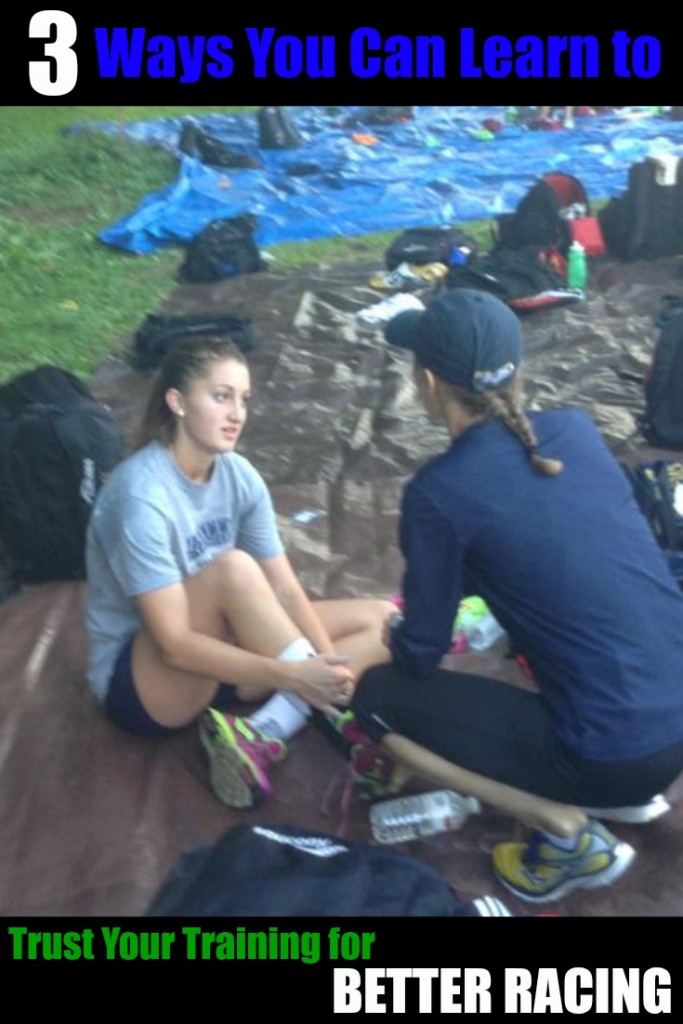 Trust. It’s an often overlooked concept when coaches and runners think about training and racing.
Trust. It’s an often overlooked concept when coaches and runners think about training and racing.
Unfortunately, trusting your training plan, your fitness, and even yourself is as critical in running as it is in the relationship you have with your spouse.
Too often, runners don’t trust their own training (even when they have a well-written plan or a coach by their side), they don’t trust their race plan (negative splitting is a difficult concept to master, especially when “time in the bank” seems so appealing), and runners don’t trust the hard work they’ve put in, even after countless miles and track intervals (which leads to a lack of self confidence and negative thinking).
If you’re a beginner runner (or even a veteran) and you think you’re alone every time you question your fitness, your training plan, or your race strategy, you couldn’t be farther from the truth. A member of the RunnersConnect team, Jamie Dodge, shared her struggles with trusting her coach in a very well-written and honest blog post about her training. Her sincere and passionate post is what sparked my thoughts on this subject.
Lack of trust in my training is the most difficult struggle I encountered as a competitive runner.
Even more than my numerous injuries and more than bad race results, which I believe were a consequence of me not having faith in my training. The biggest mistake I made throughout my career was not trusting my coaches, not trusting myself, and not trusting my fitness.
To help you better understand this concept, and hopefully prevent you from making the same mistakes, here are three very specific examples of how a lack of belief in my coaches, my training, and myself lead to poor results and injuries, and how you can prevent similar situations from happening to you.
Trust your fitness
In the spring of 2007 I qualified for my second USATF Championships at 10000 meters. While I had qualified for and raced in this event in 2006, I was still in awe that I would have the opportunity to line up on the track with the best 10k runners in the country.
My training had been going well (I had just set PR a 1500 meters and was running well in some prestigious road races), and I had honed a consistent, negative split racing strategy that would enable me to finish high in the results. But as I sat in my hotel room the night before the race and looked at the entry list, all confidence in my training and fitness began to wane.
I scrolled my finger down the list and analyzed the well-known runners I would be competing with the next day: Galen Rupp, Meb Keflezighi, Abdi Abdirahman, Dathan Ritzenhein, Ryan Hall – I was going to get my butt kicked.
By the time I toed the line that Saturday evening, my confidence in my fitness and my race plan was non-existent. When the gun sounded, I ditched my race plan and just stuck myself in the middle of the pack, “hoping” I would run well and others would fade.
As the race began to heat up after 5k I found myself questioning my fitness. When a runner would pass me, instead of latching on or being confident in my plan that these runners would come back to me, I began thinking to myself, “geez, these guys are fast, what am I doing here, they aren’t going to come back to me”.
When the dust finally settled, I finished in second to last place in the slowest 10k time of my career. If I had only trusted my training and my race strategy by running the conservative 29-minute 10k I knew I was capable of, I would have finished in the top 10.
Your takeaway
To consistently run well, it is critical that you have an unwavering belief in your fitness and your race plan.
When you line up at your next race, don’t let that “really fit looking runner” derail your own self-confidence and don’t get sucked into starting too fast because you’re worried your negative split race strategy won’t work.
I’ve written a few articles on the power of self-belief and mental training that can help you maintain your confidence when you begin to doubt yourself. Practice these mental strategies in training and implement them on race day to ensure that you always trust your fitness.
Trust your coach or your training plan
After that terrible race in 2007, I was hungry to get back on the roads and redeem myself. However, it had been a long spring of racing and I was physically and mentally burnt out. My coach insisted that I cut back my volume and intensity and focus on recovery for three to four weeks.
He explained to me that while I would sacrifice short-term redemption, the recovery would allow me to run well through the late summer and fall.
Like many runners, I was stubborn and lacked confidence in the validity of my training plan and the ability to open up and trust my coach.
I kept pushing the training instead of taking the time off my coach insisted upon. As a result, the bad races continued to pile up. That August I ran the two worst road races of my career and was at an all-time low with my training and racing.
I wish I could say this was the first time I had neglected the advice of my coach or failed to follow what was a great training plan.
Like most runners, I always wanted more mileage, more workouts, and faster results. Unfortunately, because I never had self-confidence to trust in my coach or training plan, I was chronically struggling with my running and never saw that linear progression we all strive for.
Your takeaway
If you’re going to put in all the work and planning it takes to choose the right training plan or the perfect coach to work with – trust it.
Learn to let go of your fears and stop listening to the hundreds of different opinions you’ll get from running friends or message boards.
Most renowned coaches and training plans are meticulously researched and are backed with expert experience. Boosting mileage, running faster than you’re prescribed, or adding additional runs is a recipe for disaster.
Of course, if you’re using a generic plan you will need to modify some elements to align with your individual needs and weaknesses, but trust in the physiological principles created for you.
Trust yourself
Perhaps the hardest lesson I had to learn as a runner was that being tough didn’t mean beating myself up on every run or pushing my body through fatigue. That mentality was ingrained since childhood, which it is for many athletes, but it couldn’t be further from the attitude needed to be a good distance runner. As legendary coach Alberto Salazar says:
“You’ve got to have the confidence in yourself where you believe that you can take those days off and you can recover and you can run great. A lot of what we see in athletes that just train all the time and never give themselves adequate recovery is often portrayed as toughness. What I’ve realized over the years is it really is a weakness. It’s an insecurity that you’re not good enough to recover like other athletes: I’m not good enough to do that; I need to keep training; I can’t take time off; I can’t take easy days.”
In the spring of 2008 I was training for a spot at the Olympic Trials in the 10k. I knew I had to push the limits. Unfortunately, I caught a bad cold that wiped me out for almost a week. I should have had the confidence in myself to rest for a few days and put in a week of easy 4-6 milers and let my body recover.
I wouldn’t have lost any fitness, but I would have been able to train harder when it counted and put in the specific work I needed to succeed.
However, because I lacked confidence in myself, I stubbornly tried to push through and get in all my miles. My stubbornness only lead to a season of up and down workouts and race results and ultimately ended with a torn plantar fascia.
Looking back at all my training I’ve never once said, “boy, I wish I had trained harder”, but I have looked back and wished I would have trained smarter.
Your takeaway
Learn from my mistakes and the words of Alberto Salazar – trust yourself to listen to your body when it’s tired or injured.
Have the confidence to take a few rest days and let yourself recover when you’re in doubt. With the technology available these days, we have unlimited opportunities to track and record almost every facet of our training.
Don’t be a slave to your Garmin or your Runkeeper log and tick off training days just because your schedule says you should. Be flexible, listen to your body, and train smarter.
I hope you enjoyed this reflection on trust and the personal struggles that I shared. As my approach to training and racing has shifted from athlete to coach, the importance of trust is something that I continue to see everyday.
Whether it be a golfer confiding in his caddy to choose the right club or having faith in a coach to lay out the perfect training plan, trust is a critical element that the best athletes in the world have.
If you ever find yourself in this dreaded position here are three easy nutrition changes you can make to help dig yourself out of that ovetraining hole.




